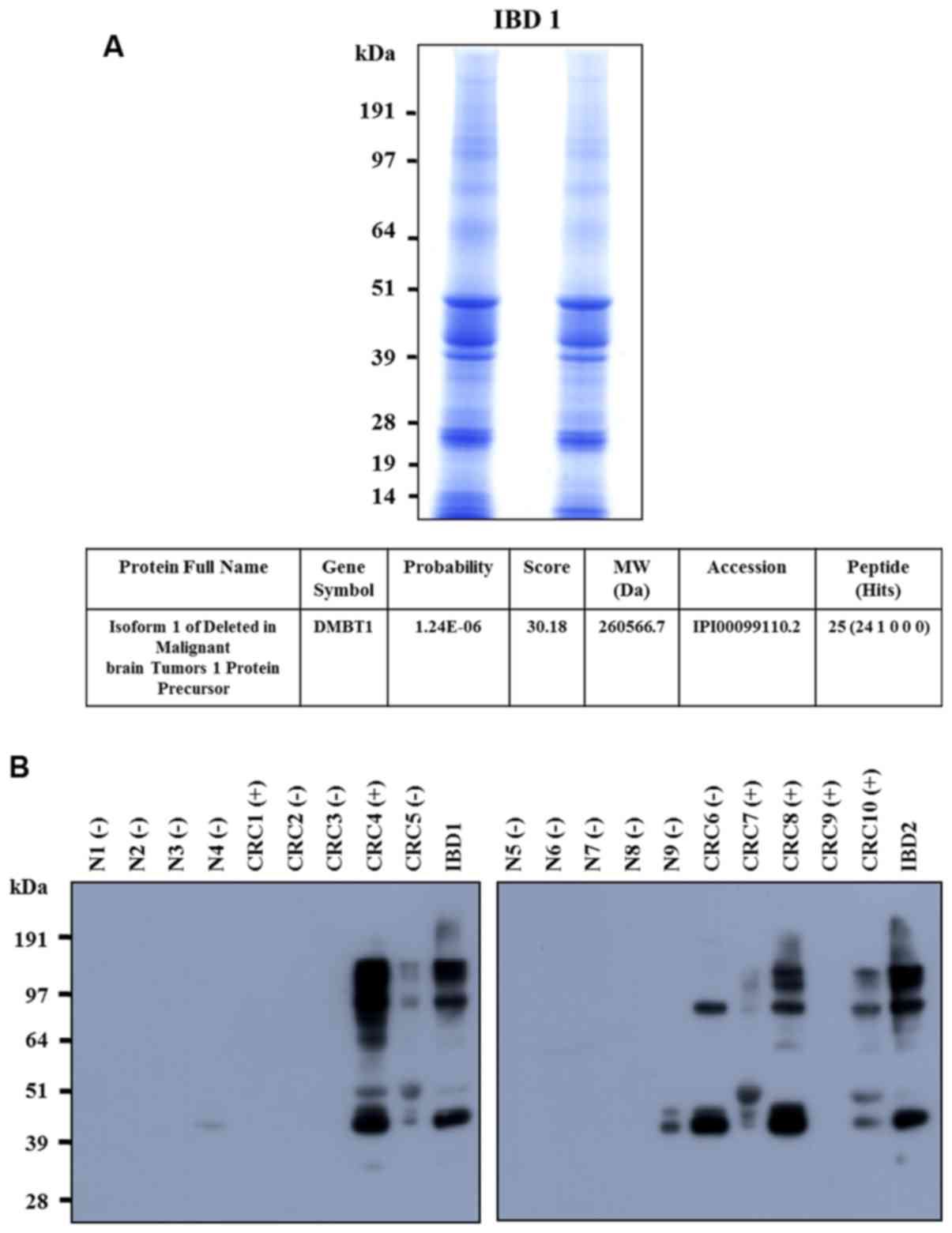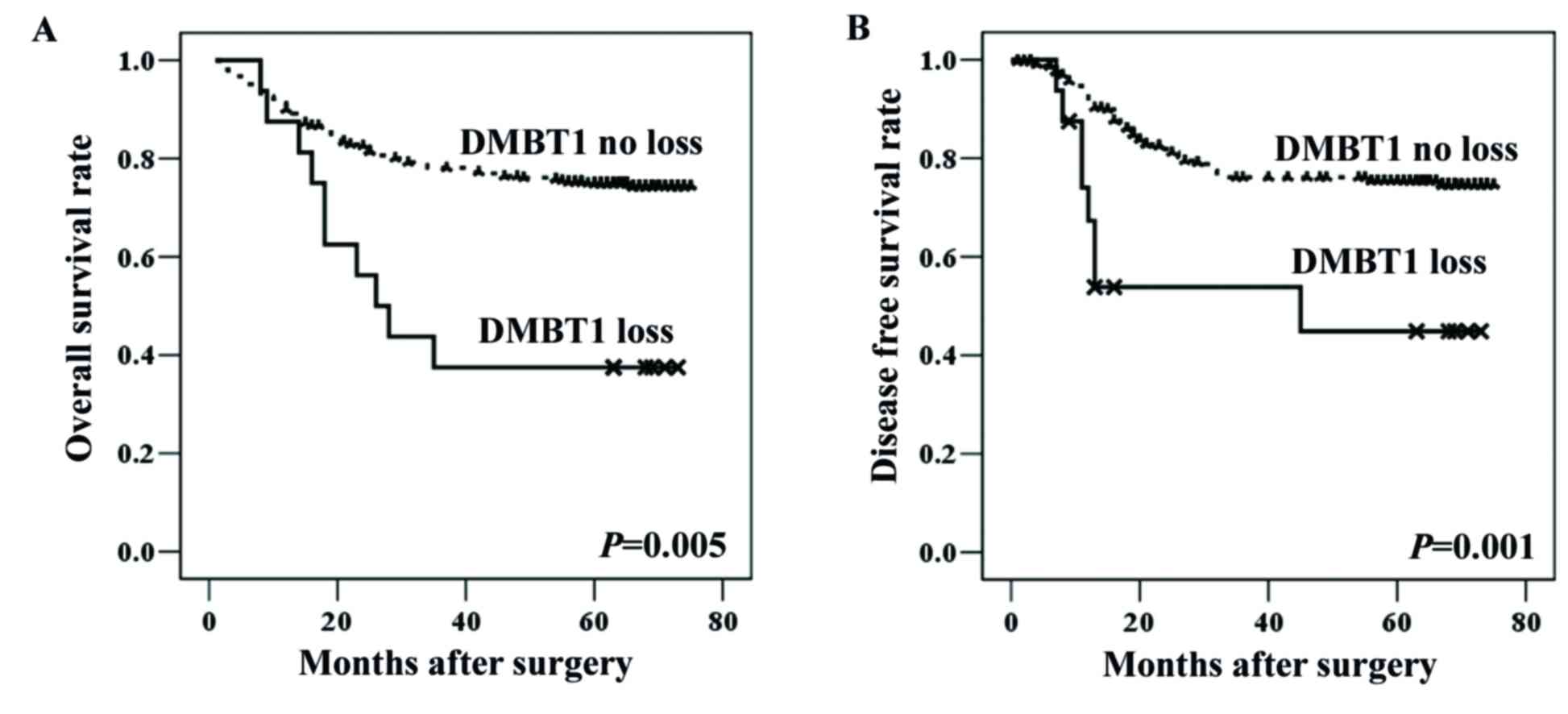|
1
|
Ferlay J, Soerjomataram I, Dikshit R, Eser
S, Mathers C, Rebelo M, Parkin DM, Forman D and Bray F: Cancer
incidence and mortality worldwide: Sources, methods and major
patterns in GLOBOCAN 2012. Int J Cancer. 136:E359–E386. 2015.
View Article : Google Scholar : PubMed/NCBI
|
|
2
|
Jung KW, Won YJ, Oh CM, Kong HJ, Lee DH
and Lee KH: Community of Population-Based Regional Cancer
Registries: Cancer Statistics in Korea: Incidence, mortality,
survival, and prevalence in 2014. Cancer Res Treat. 49:292–305.
2017. View Article : Google Scholar : PubMed/NCBI
|
|
3
|
Rhodes JM: Colorectal cancer screening in
the UK: Joint position statement by the British Society of
Gastroenterology, The Royal College of Physicians, and The
Association of Coloproctology of Great Britain and Ireland. Gut.
46:746–748. 2000. View Article : Google Scholar : PubMed/NCBI
|
|
4
|
Kim BC, Joo J, Chang HJ, Yeo HY, Yoo BC,
Park B, Park JW, Sohn DK, Hong CW and Han KS: A predictive model
combining fecal calgranulin B and fecal occult blood tests can
improve the diagnosis of colorectal cancer. PLoS One.
9:e1061822014. View Article : Google Scholar : PubMed/NCBI
|
|
5
|
Yoo BC, Shin YK, Lim SB, Hong SH, Jeong SY
and Park JG: Evaluation of calgranulin B in stools from the
patients with colorectal cancer. Dis Colon Rectum. 51:1703–1709.
2008. View Article : Google Scholar : PubMed/NCBI
|
|
6
|
Mollenhauer J, Wiemann S, Scheurlen W,
Korn B, Hayashi Y, Wilgenbus KK, von Deimling A and Poustka A:
DMBT1, a new member of the SRCR superfamily, on chromosome
10q25.3–26.1 is deleted in malignant brain tumours. Nat Genet.
17:32–39. 1997. View Article : Google Scholar : PubMed/NCBI
|
|
7
|
Ligtenberg TJ, Bikker FJ, Groenink J,
Tornoe I, Leth-Larsen R, Veerman EC, Amerongen Nieuw AV and
Holmskov U: Human salivary agglutinin binds to lung surfactant
protein-D and is identical with scavenger receptor protein gp-340.
Biochem J. 359:243–248. 2001. View Article : Google Scholar : PubMed/NCBI
|
|
8
|
Ligtenberg AJ, Karlsson NG and Veerman EC:
Deleted in malignant brain tumors-1 protein (DMBT1): A pattern
recognition receptor with multiple binding sites. Int J Mol Sci.
11:5212–5233. 2010. View Article : Google Scholar : PubMed/NCBI
|
|
9
|
Madsen J, Mollenhauer J and Holmskov U:
Review: Gp-340/DMBT1 in mucosal innate immunity. Innate Immun.
16:160–167. 2010. View Article : Google Scholar : PubMed/NCBI
|
|
10
|
Vijayakumar S, Takito J, Hikita C and
Al-Awqati Q: Hensin remodels the apical cytoskeleton and induces
columnarization of intercalated epithelial cells: Processes that
resemble terminal differentiation. J Cell Biol. 144:1057–1067.
1999. View Article : Google Scholar : PubMed/NCBI
|
|
11
|
Cheng H, Bjerknes M and Chen H:
CRP-ductin: A gene expressed in intestinal crypts and in pancreatic
and hepatic ducts. Anat Rec. 244:327–343. 1996. View Article : Google Scholar : PubMed/NCBI
|
|
12
|
Holmskov U, Mollenhauer J, Madsen J,
Vitved L, Gronlund J, Tornoe I, Kliem A, Reid KB, Poustka A and
Skjodt K: Cloning of gp-340, a putative opsonin receptor for lung
surfactant protein D. Proc Natl Acad Sci USA. 96:10794–10799. 1999.
View Article : Google Scholar : PubMed/NCBI
|
|
13
|
Madsen J, Sorensen GL, Nielsen O, Tornøe
I, Thim L, Fenger C, Mollenhauer J and Holmskov U: A variant form
of the human deleted in malignant brain tumor 1 (DMBT1) gene shows
increased expression in inflammatory bowel diseases and interacts
with dimeric trefoil factor 3 (TFF3). PLoS One. 8:e644412013.
View Article : Google Scholar : PubMed/NCBI
|
|
14
|
Garay J, Piazuelo MB, Lopez-Carrillo L,
Leal YA, Majumdar S, Li L, Cruz-Rodriguez N, Serrano-Gomez SJ,
Busso CS, Schneider BG, et al: Increased expression of deleted in
malignant brain tumors (DMBT1) gene in precancerous gastric
lesions: Findings from human and animal studies. Oncotarget.
8:47076–47089. 2017. View Article : Google Scholar : PubMed/NCBI
|
|
15
|
Mollenhauer J, Holmskov U, Wiemann S,
Krebs I, Herbertz S, Madsen J, Kioschis P, Coy JF and Poustka A:
The genomic structure of the DMBT1 gene: Evidence for a region with
susceptibility to genomic instability. Oncogene. 18:6233–6240.
1999. View Article : Google Scholar : PubMed/NCBI
|
|
16
|
Wu W, Kemp BL, Proctor ML, Gazdar AF,
Minna JD, Hong WK and Mao L: Expression of DMBT1, a candidate tumor
suppressor gene, is frequently lost in lung cancer. Cancer Res.
59:1846–1851. 1999.PubMed/NCBI
|
|
17
|
Mori M, Shiraishi T, Tanaka S, Yamagata M,
Mafune K, Tanaka Y, Ueo H, Barnard GF and Sugimachi K: Lack of
DMBT1 expression in oesophageal, gastric and colon cancers. Br J
Cancer. 79:211–213. 1999. View Article : Google Scholar : PubMed/NCBI
|
|
18
|
Braidotti P, Nuciforo PG, Mollenhauer J,
Poustka A, Pellegrini C, Moro A, Bulfamante G, Coggi G, Bosari S
and Pietra GG: DMBT1 expression is down-regulated in breast cancer.
BMC Cancer. 4:462004. View Article : Google Scholar : PubMed/NCBI
|
|
19
|
Mueller W, Mollenhauer J, Stockhammer F,
Poustka A and von Deimling A: Rare mutations of the DMBT1 gene in
human astrocytic gliomas. Oncogene. 21:5956–5959. 2002. View Article : Google Scholar : PubMed/NCBI
|
|
20
|
Mollenhauer J, Herbertz S, Holmskov U,
Tolnay M, Krebs I, Merlo A, Schrøder HD, Maier D, Breitling F,
Wiemann S, et al: DMBT1 encodes a protein involved in the immune
defense and in epithelial differentiation and is highly unstable in
cancer. Cancer Res. 60:1704–1710. 2000.PubMed/NCBI
|
|
21
|
Conde AR, Martins AP, Brito M, Manuel A,
Ramos S, Malta-Vacas J, Renner M, Poustka A, Mollenhauer J and
Monteiro C: DMBT1 is frequently downregulated in
well-differentiated gastric carcinoma but more frequently
upregulated across various gastric cancer types. Int J Oncol.
30:1441–1446. 2007.PubMed/NCBI
|
|
22
|
Mollenhauer J, Helmke B, Müller H,
Kollender G, Lyer S, Diedrichs L, Holmskov U, Ligtenberg T,
Herbertz S, Krebs I, et al: Sequential changes of the DMBT1
expression and location in normal lung tissue and lung carcinomas.
Genes Chromosomes Cancer. 35:164–169. 2002. View Article : Google Scholar : PubMed/NCBI
|
|
23
|
World Health Organization, . WHO
Classification of Tumours of the Digestive SystemBosman FT,
Carneiro F, Hruban RH and Theise ND: 3. 4th. IARC; Lyon: 2010
|
|
24
|
American Joint Committee on Cancer: AJCC
Cancer Staging Atlas. Greene FL, Compton CC, Fritz AG, Shah JP and
Winchester DP: Springer; New York: 2006, doi:
org/10.1007/0-387-33126-3.
|
|
25
|
Lieberman DA, Weiss DG, Bond JH, Ahnen DJ,
Garewal H and Chejfec G: Use of colonoscopy to screen asymptomatic
adults for colorectal cancer. Veterans Affairs Cooperative Study
Group 380. N Engl J Med. 343:162–168. 2000. View Article : Google Scholar : PubMed/NCBI
|
|
26
|
Yao T, Matsui T and Hiwatashi N: Crohn's
disease in Japan: Diagnostic criteria and epidemiology. Dis Colon
Rectum. 43 Suppl:S85–S93. 2000. View Article : Google Scholar : PubMed/NCBI
|
|
27
|
Choi CH, Jung SA, Lee BI, Lee KM, Kim JS
and Han DS: IBD Study Group of the Korean Association of the Study
of Intestinal Diseases: Diagnostic guideline of ulcerative colitis.
Korean J Gastroenterol. 53:145–160. 2009.(In Korean). PubMed/NCBI
|
|
28
|
Ye BD, Jang BI, Jeen YT, Lee KM, Kim JS
and Yang SK: IBD Study Group of the Korean Association of the Study
of Intestinal Diseases: Diagnostic guideline of Crohn's disease.
Korean J Gastroenterol. 53:161–176. 2009.(In Korean). PubMed/NCBI
|
|
29
|
Telakis E and Tsironi E: Indeterminate
colitis-definition, diagnosis, characteristics and management. Ann
Gastroenterol. 21:173–180. 2009.
|
|
30
|
Foell D, Wittkowski H and Roth J:
Monitoring disease activity by stool analyses: From occult blood to
molecular markers of intestinal inflammation and damage. Gut.
58:859–868. 2009. View Article : Google Scholar : PubMed/NCBI
|
|
31
|
Rosenstiel P, Sina C, End C, Renner M,
Lyer S, Till A, Hellmig S, Nikolaus S, Fölsch UR, Helmke B, et al:
Regulation of DMBT1 via NOD2 and TLR4 in intestinal epithelial
cells modulates bacterial recognition and invasion. J Immunol.
178:8203–8211. 2007. View Article : Google Scholar : PubMed/NCBI
|
|
32
|
Mollenhauer J, Helmke B, Müller H,
Kollender G, Krebs I, Wiemann S, Holmskov U, Madsen J, Otto HF and
Poustka A: An integrative model on the role of DMBT1 in epithelial
cancer. Cancer Detect Prev. 26:266–274. 2002. View Article : Google Scholar : PubMed/NCBI
|
|
33
|
Goeppert B, Roessler S, Becker N, Zucknick
M, Vogel MN, Warth A, Pathil-Warth A, Mehrabi A, Schirmacher P,
Mollenhauer J, et al: DMBT1 expression in biliary carcinogenesis
with correlation of clinicopathological data. Histopathology.
70:1064–1071. 2017. View Article : Google Scholar : PubMed/NCBI
|

















